Key takeaways:
- Clear communication frameworks are essential for reducing misunderstandings and enhancing collaboration in teams.
- Defining focused research questions guides the research process, fosters engagement, and encourages deeper insights.
- Embracing ambiguity in questions can lead to richer insights and a better understanding of complex topics.
- Personal experiences and collaboration refine research questions, making them more relatable and impactful.
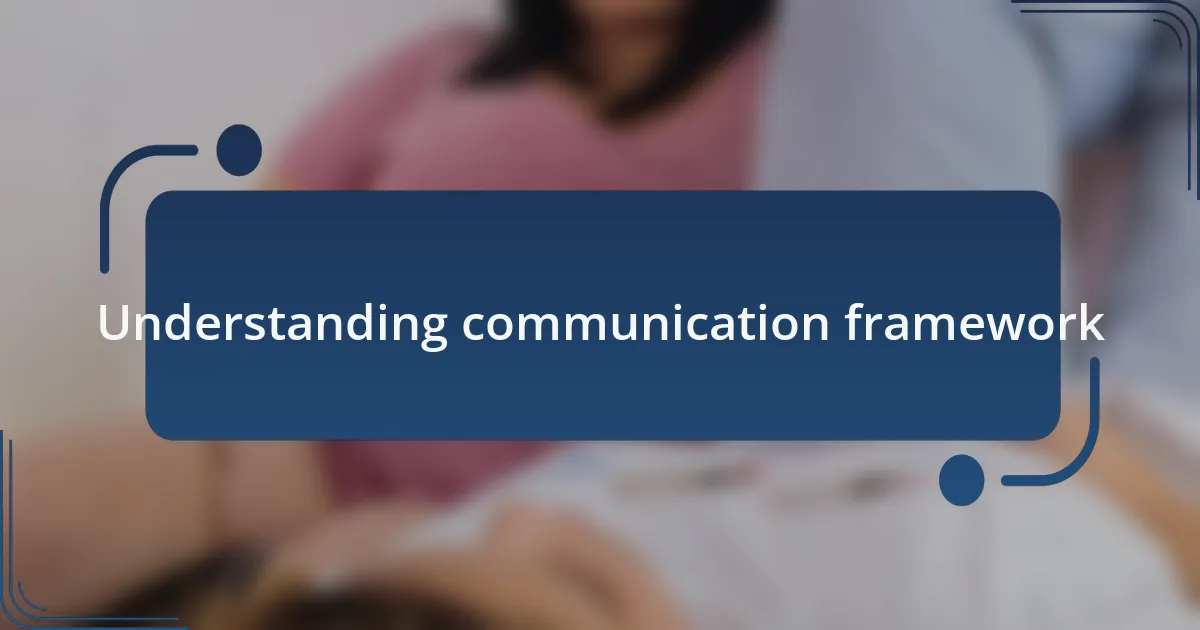
Understanding communication framework
Understanding a communication framework is crucial because it shapes how we convey and interpret messages. I remember a time during a group project when miscommunication led to confusion and frustration. That experience highlighted how vital it is to have a clear structure that defines roles, channels, and feedback methods.
When I delve into the specifics of a communication framework, I often reflect on how it empowers both the sender and the receiver. For instance, have you ever felt unheard in a conversation? It’s this framework that ensures everyone’s voice is valued and respected. I’ve seen how, in well-structured environments, misunderstandings diminish, paving the way for more productive discussions.
Every organization or team, in my experience, has its unique communication style. I can’t help but wonder, what if we could all adapt a framework that not only aligns with our objectives but also resonates with our core values? It’s a powerful thought that encourages introspection and transformation.
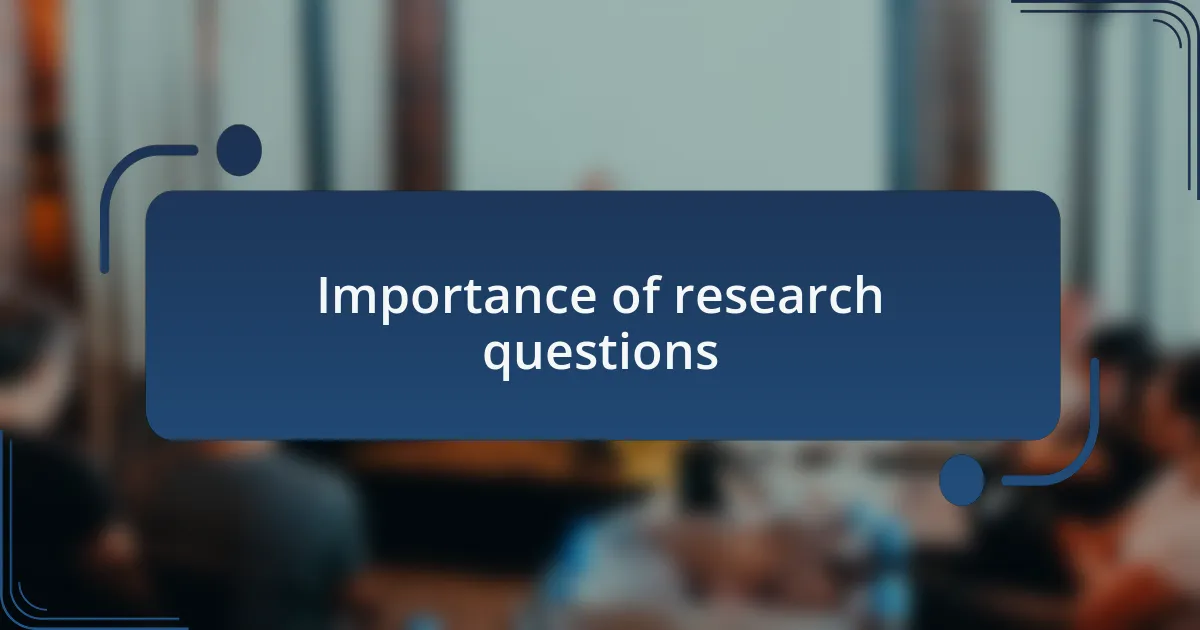
Importance of research questions
Defining research questions is like setting a compass for your exploration. I remember when I first struggled to pinpoint the focus of my project, only to realize that vague questions led me down a convoluted path. It’s fascinating how precise questions can streamline the research process, directing our efforts where they matter most.
Without clear research questions, I often find that the entire study can drift aimlessly. Have you ever started a task without a plan? That’s exactly how research feels without focused inquiries guiding each step. It transforms a daunting project into a manageable journey, helping to maintain momentum and clarity.
In my experience, the importance of research questions extends beyond just defining the scope; they also spark curiosity and engagement. I once crafted questions that intrigued my team and ignited passionate discussions. That moment revealed how powerful well-crafted questions could be in fostering a collaborative atmosphere, encouraging diverse viewpoints and deeper insights.
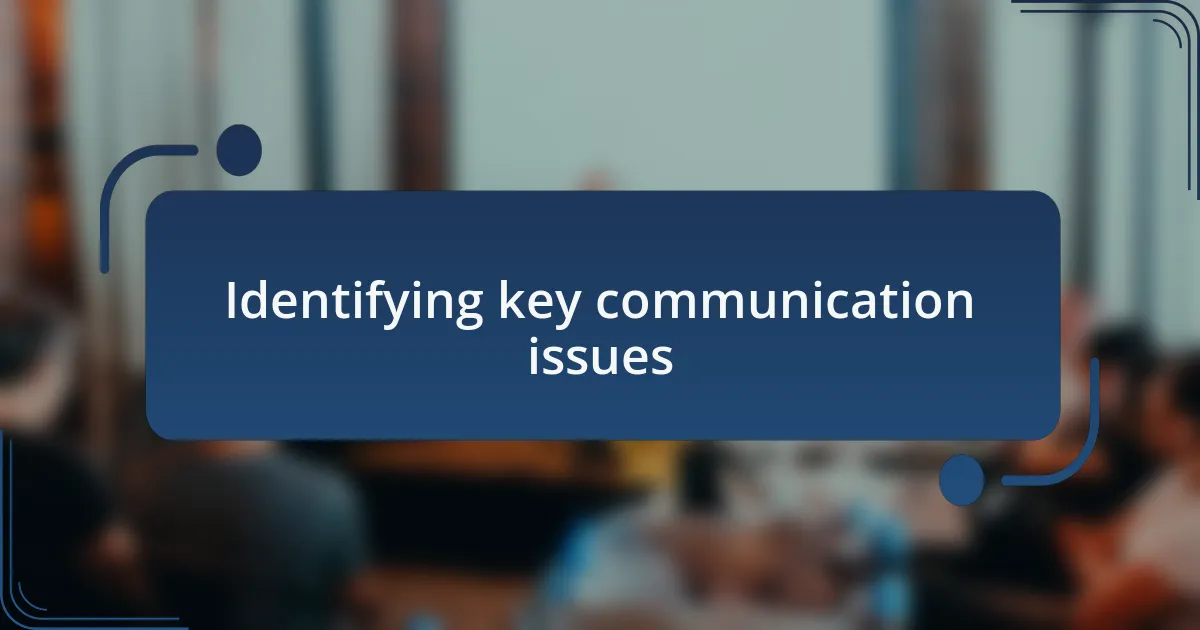
Identifying key communication issues
Identifying key communication issues is often a process of careful observation and reflection. I remember sitting in a meeting, listening to varying opinions on a project, and realizing that misunderstandings stemmed from different interpretations of a single term. Moments like this highlight the importance of recognizing what specifically causes confusion; it’s not just about the content but the context in which it’s delivered.
In my experience, I’ve found that effective communication issues often emerge during team interactions. I once facilitated a workshop on communication barriers, and it was enlightening to hear team members share their frustrations. Issues like unclear messaging or the absence of feedback loops came to the forefront. This dialogue made me realize that simply identifying these challenges can pave the way for tailored solutions, ensuring everyone feels heard and valued.
As I delved deeper into communication issues, I discovered an essential truth: what goes unspoken can be just as significant as what is communicated. I’ve often noticed that assumptions linger in the background, creating tension that goes unaddressed. Have you ever felt that palpable silence during a discussion? Addressing these unspoken issues allows for a more authentic dialogue, fostering an environment where everyone can thrive.
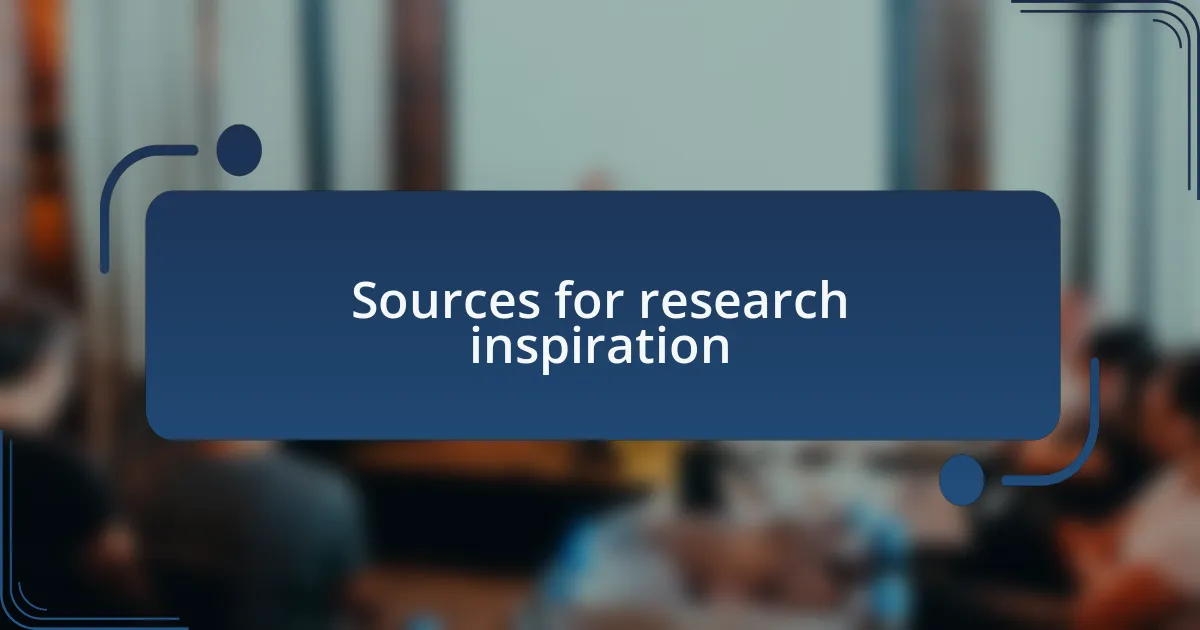
Sources for research inspiration
When it comes to sourcing inspiration for research questions, I often turn to my own experiences in the field. For instance, a conversation I had with a colleague sparked an interest in the efficacy of virtual communication tools. We debated whether these platforms truly capture the nuances of face-to-face exchanges. That interaction led me to explore how technology affects interpersonal communication, a journey that offered a wealth of insights for framing my research questions.
I’ve also discovered that literature can be a treasure trove of inspiration. Recently, I revisited academic journals that discuss symbolic interactionism—a theory focusing on the meanings people derive from social interactions. I found a particularly compelling article that examined how language shapes identity. Reflecting on my own experiences with diverse groups, I realized that understanding these dynamics could help refine my research focus. Have you read something that struck a chord with you? This can often be a springboard for deeper inquiries.
Peer discussions and workshops are invaluable for uncovering inspiring research angles. I once participated in a seminar where participants shared their unique challenges in team communication. I was captivated by one participant’s struggle with cross-cultural misunderstandings. It dawned on me that these real-life scenarios can lead to profound research questions. What are the underlying biases that affect such exchanges? In engaging with others, I find that inspiration often blossoms from seeing the world through different perspectives.
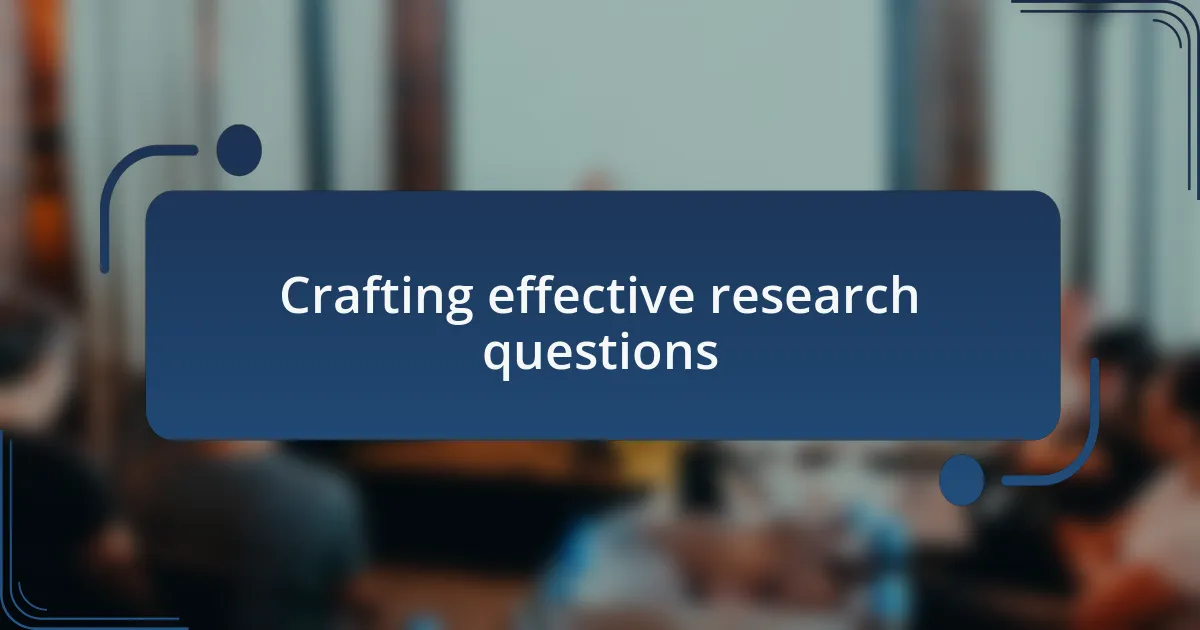
Crafting effective research questions
Crafting effective research questions begins with a clear understanding of your focal point and its broader implications. For example, when I was puzzled about how social media influences user engagement, I started by asking myself what specific aspects of communication are impacted. This initial curiosity led me to formulate questions like, “How does the use of emojis alter the perception of a message?” That clarity helped shape my research direction significantly.
Another approach I’ve found to be effective is framing my questions in a way that invites exploration rather than simple answers. I once wrestled with the dynamics of group chats in professional settings. Rather than sticking to “Do group chats improve communication?”, I shifted my focus to “In what ways do group chats alter decision-making?” This subtle change opened up avenues for deeper analysis and allowed for richer data collection.
Lastly, I believe that personal connection to the research question can significantly enhance its effectiveness. During a project on workplace feedback, I reflected on my experiences receiving both constructive and critical feedback. This reflection led me to ask, “How do emotional reactions to feedback influence communication outcomes?” Such personally resonant questions not only drive my curiosity but also yield insights that are relevant and relatable to others. Isn’t it fascinating how our experiences shape our inquisitive minds?
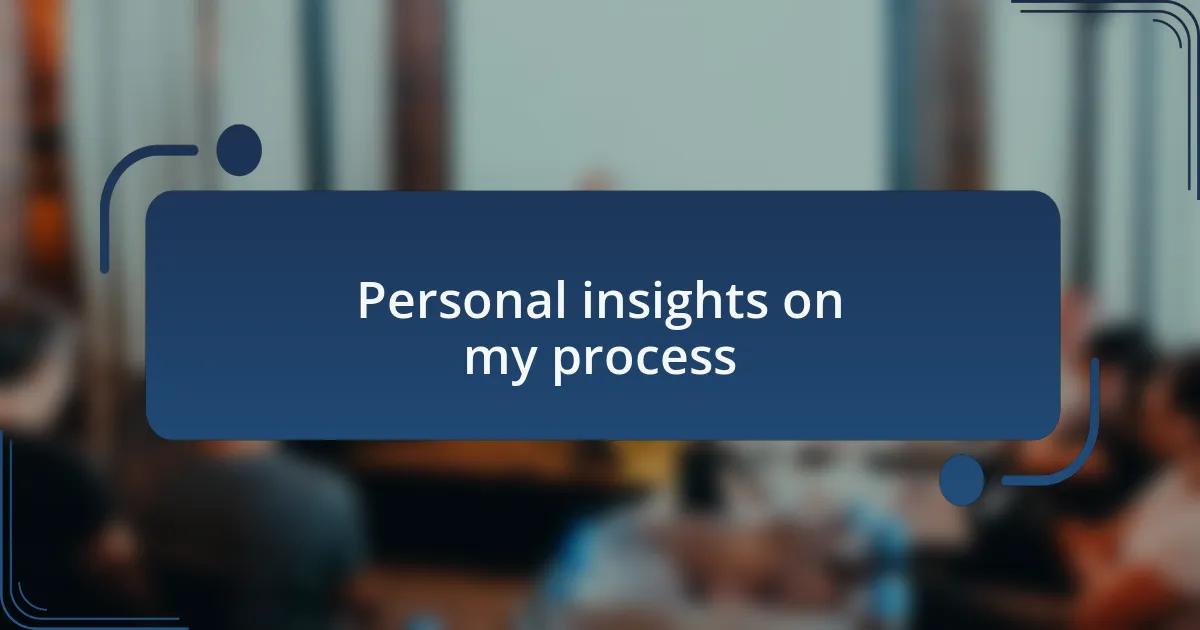
Personal insights on my process
Crafting research questions is an inherently personal journey for me. I remember sitting at my desk one evening, reflecting on my struggles with small talk during networking events. This introspection prompted me to ask, “What communication strategies ease the discomfort of initiating conversations?” The act of turning my discomfort into a question was not just a research step; it was an exploration of my own vulnerabilities.
I also find that bouncing ideas off colleagues can refine my questions significantly. When discussing the effects of body language in presentations, a colleague suggested we think about audience perception. This led me to pose, “How does a speaker’s non-verbal communication shape audience engagement?” It’s incredible how collaboration can modify personal questioning, often unveiling angles I hadn’t considered before. Have you ever had a conversation that completely shifted your perspective on a topic?
Finally, revisiting my questions over time is invaluable. Upon reviewing my early queries on digital communication, I noticed they lacked depth. I then rephrased them to dig deeper, such as changing “What impact does texting have on personal relationships?” to “In what ways do texting habits redefine emotional intimacy?” This evolution not only represents personal growth but also enriches the research process. How often do we allow our questions to evolve alongside our understanding? It’s a reminder that inquiry is not static; it develops as we do.

Lessons learned from my experience
One of the key lessons I learned is the importance of embracing ambiguity in my questions. Early on, I was set on crafting specific, neat questions, but I soon realized that leaving some of my inquiries open-ended could lead to richer insights. For instance, when I explored the impact of social media on communication, I first framed the question too narrowly. It wasn’t until I broadened it to, “What complexities arise in our interactions through social media?” that I began to uncover layers of complexity I had previously overlooked. This change not only deepened my research but also ignited a newfound passion.
Another significant realization came from allowing my personal experiences to inform my questions more profoundly. A few years back, during a challenging communication workshop, I felt frustrated by my inability to express myself. Reflecting on that experience led me to ask, “What barriers prevent individuals from effectively articulating their thoughts?” This question opened the door to understanding communication styles in various contexts. How often do we forget to draw from our own challenges? This connection has made my research more relatable and impactful, as it resonates with the struggles others face.
Lastly, I learned the value in patience and persistence. Initially, I approached my research with a sense of urgency to find answers, but I discovered that crafting meaningful questions often takes time. I recall spending weeks grappling with the question of how generational differences affect communication preferences. Only after revisiting it repeatedly did I find clarity, ultimately formulating, “How do differing generational values shape communication styles in the workplace?” This experience taught me that research is a journey, not a sprint. How often do we rush through our own processes, missing valuable insights along the way? Taking the time to reflect can indeed yield profound revelations.